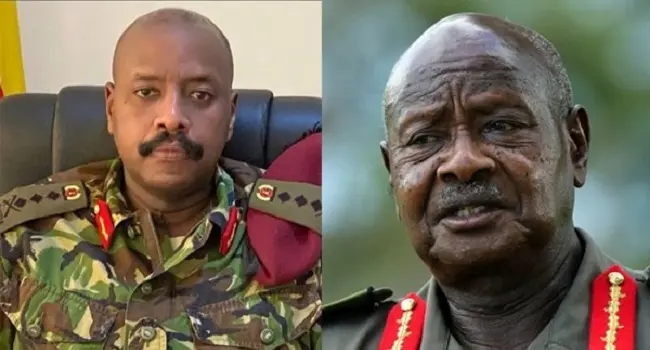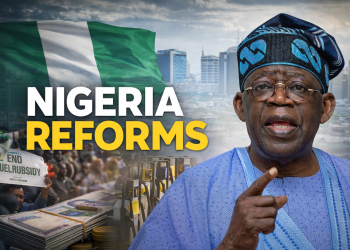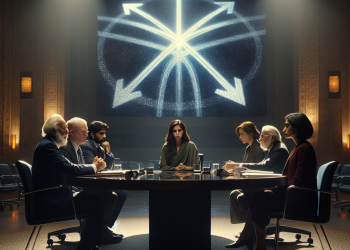The President of Uganda, Yoweri Museveni, appointed his eldest son, Gen. Muhoozi Kainerugaba as the military’s top commander.
After spending thirty-eight years in power, this controversial move made Ugadans believe that Museveni was grooming his eldest child for the presidency.
A statement from the Defence Ministry indicated that General, Wilson Mbadi, whom the president’s son succeeded was reassigned as a junior minister.
It was reported that recently, Gen. Kainerugaba, son of the Ugandan president, has been conducting rallies across the country, despite a law that prohibits serving army officers from participating in partisan politics.
However, he argues that his actions, such as the recent launch of the nonpartisan activist group called the Patriotic League of Uganda, are aimed at fostering patriotism among Ugandans.
On Thursday evening, the Ministry of Defence and Veteran Affairs made a significant announcement regarding General Muhoozi Kainerugaba.
He has been appointed as the chief of defence forces, marking a remarkable milestone in his rapid rise through the ranks of the Ugandan army since the late 1990s.
Also Read: Niger Republic Says US Military Presence Is Illegal
Last year, Kainerugaba expressed his intention to run for the presidency in the 2026 elections on X. However, reports indicate that he has also denied claims suggesting that he is eyeing the top job.
Museveni, who first took over power in 1986 and has been elected six times, has not said when he will retire. He has no rivals within the ruling National Resistance Movement party because many believe the military will have a say in choosing his successor.
Kainerugaba’s allies are strategically deployed in command positions across the security services, according to observers.
A proposed “Muhoozi Project”, which indicates a succession plan came into the limelight in Uganda after Kainerugaba’s rapid rise through the military ranks since he joined in the late 1990s.
Despite both the father and son denying any deliberate succession plan, the series of appointments of Kainerugaba to significant military positions over the year, particularly during moments of political upheaval, alongside his engagement in political affairs, has sparked debates regarding potential hereditary rule in the East African nation.
In support of the long-standing leadership in Uganda, Museveni’s supporters claim he offers leverage for a peaceful transfer of power from the former British colony, potentially the first since independence in 1962.
Critics fear that his style of leadership might lead to hereditary rule in the East African country.
In 2013, police closed down two independent newspapers and two radio stations for ten days. This action came after these media outlets published a leaked confidential memo from a senior general.
The memo alleged that Museveni was grooming Kainerugaba to take over his position in the future.
In 2023, Kainerugaba revealed that Uganda would “send soldiers to defend Moscow if it’s ever threatened by the Imperialists”, chiding Western nations for sharing “useless pro-Ukraine propaganda.”
Uganda is due to hold its next presidential election in 2026 and Museveni is widely expected to seek re-election as his custom for the past thirty-eight years.
The last election held in 2021 was very controversial as Museveni’s opponent, Bobi Wine was detained a day before the election and his campaign was marred with violence.
What this means
President Museveni’s appointment of his eldest son as the country’s military top commander carries significant implications for Uganda’s political and military landscape. On one hand, it underscores the deep-rooted familial influence within Uganda’s leadership, highlighting the consolidation of power within the Museveni family. This move may further strengthen the president’s grip on the military and overall governance, as familial ties often translate into loyalty and trust, crucial elements in maintaining control in political and military spheres.
The appointment also raises concerns about nepotism and the potential impact on merit-based promotions and leadership succession within the military. Critics may view this appointment as favoritism, which could lead to discontent among other senior military officials who may have been vying for the top position based on their experience and qualifications. This could potentially create internal tensions and divisions within the military hierarchy.










